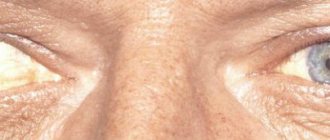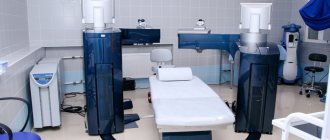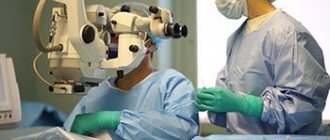The concept of a treatment quota. Legal basis
A treatment quota is a benefit for a citizen of the Russian Federation, which in some cases allows him to use the services of a state medical institution for complex and expensive procedures.
This procedure is regulated by: • Federal Law No. 323, Article 34 describes in detail the process of obtaining benefits; • Order of the Ministry of Health of the Russian Federation (930n) dated 2014 (with additions from 2020), regarding quotas for high-tech medical care (HTMC).
Important! Who is entitled to the benefit: all Russian citizens in need of medical care, this right is confirmed by Article 34 of the Federal Law “On the fundamentals of protecting the health of citizens in the Russian Federation.”
Every resident of the country who has a compulsory medical insurance policy can, by law, use free services from medical institutions.
Making an appointment with an ophthalmologist in the adult consultation and polyclinic department
I. According to the compulsory health insurance system (CHI): registration is carried out in the presence of the following referral documents:
- A referral (indicating its number) for consultation from a medical organization at the place of territorial attachment (form 057/U), certified by the signature and seal of the attending physician, the signature of the head and the seal of the medical organization for the current year (Order of the Ministry of Health of Russia dated December 2, 2014 No. 796n “On approval of the Regulations on the organization of the provision of specialized, including high-tech medical care”).
- Medical report (extract) with clinical data (no more than 1 month from the date of the last examination) on the need to provide specialized, including high-tech medical care or conduct an examination to establish a clinical diagnosis.
Without the above documents, pre-registration under the compulsory medical insurance system is not carried out!
Draw your attention to!
The time indicated in the coupon is the time of contacting the registry to draw up a medical card for an outpatient,
not appointment times at the doctor's office.
II. On an extra-budgetary basis (for a fee): registration is carried out without referral documents, a medical report (extract) is desirable.
The list of medical services and tariffs can be found in the “Services and Prices” .
Appointments with ophthalmologists from VKPO have been organized on Saturdays!
Conditions for obtaining a quota. How to collect the necessary documents
If a patient has a disease and drug treatment does not help, then the citizen can count on state help. But to do this you will have to prove that the applicant really falls under the program:
- Medical certificates should be collected indicating the presence of the disease and the ineffectiveness of treatment;
- Pass a medical examination.
Because budgets are limited and there are many eyes in need of surgery, undergoing this procedure can be difficult.
How long does the quota registration process take?
Before you receive a quota for eye surgery, you must keep in mind that it takes a lot of time to obtain the necessary certificates. After all, there are many who want it. As a result, sometimes the turn comes only after a month or three, or even after 2 years.
Thus, after a long wait, the patient will have to undergo additional medical examination again. However, if an applicant for a quota proves that he has a serious eye disease, the procedure may be accelerated
.
Step-by-step instructions for applying for a quota for eye surgery
To receive a quota for eye surgery, the applicant must go through the following steps:
- Personal appointment with a local physician (family doctor) and obtaining a referral to an ophthalmologist.
- Examination by an ophthalmologist at your place of registration and receiving a referral from him for surgery.
- Submitting a referral from an ophthalmologist to the commission of the regional Ministry of Health.
- Receiving a positive decision from the commission.
- Collection of certificates for quotas.
- Submission of laboratory tests.
- Hospitalization as directed by the attending ophthalmologist.
Important!
However, the applicant has the right to skip some stages of the procedure. Thus, the attending ophthalmologist can independently send documents regarding his patient to the commission of the regional Ministry of Health.
How to get a quota for eye surgery at the Fedorov Clinic
At the same time, it is worth collecting the required documents, such as: a referral from a municipal medical institution to the place of treatment or observation of a citizen; an extract from the patient's medical history and the results of the examination, including tests, with a recommendation to send the person to a specialized medical institution for the provision of high-tech surgical care. The listed documents must be accompanied by copies of the compulsory health insurance policy, passport, as well as a certificate of compulsory pension insurance.
This is interesting: How much noise can you make in an apartment in Irkutsk?
When a competent authority makes a decision to refuse a citizen to provide high-tech surgical care, it is necessary to require an official refusal decision in writing. This refusal can be appealed by contacting the Ministry of Health and Social Development of the Russian Federation.
How can you save money on cataract surgery if you couldn’t get a quota?
If you have a compulsory medical insurance policy in hand, you can significantly save on cataract surgery. Thus, medical insurance provides free diagnosis and treatment in a hospital (hospital).
The operation to replace the lens is also carried out at the expense of the Federal Compulsory Medical Insurance Fund. However, free medical services are provided only in some clinics in the Russian Federation. The table below shows the main types of lenses and their nuances.
| № | Types of lenses (artificial lenses) | Nuances |
| 1 | Intraocular | Made from soft materials, similar to contact lenses |
| 2 | Toric, aspheric or multifocal | Compensation of refractive error (so, astigmatism) |
| 3 | UV Protected IOL Lenses | Increases visual acuity |
Before choosing a suitable lens, you need to call several clinics to find out the possibility of replacing it under the compulsory medical insurance policy. Also, for advice you should contact your attending ophthalmologist at the clinic at your place of registration.
Free surgery to remove cataracts (according to the policy for pensioners)
There are three ways to reduce the cost of lens replacement and make your life a little easier.
According to the compulsory medical insurance policy. The presence of this document allows you to undergo free preoperative cataract diagnostics and receive a referral for free cataract extraction with implantation of an artificial domestic lens. Previously, during this operation, a significant incision of up to 9mm was made, which then required a suture and a long recovery period.
Recently, cataract removal using phacoemulsification has been available for quota patients, but the most affordable lens is installed. If a patient wants to receive a premium lens (for example, a multifocal lens, which makes it possible to see at distance, near and at an intermediate distance without glasses), then this requires an additional payment.
When removing cataracts, the compulsory medical insurance policy, both day hospital (if required) and food, are provided free of charge.
According to the VHI policy. Referral under this policy includes free preoperative diagnosis of cataracts, plus hospital treatment. However, lens transplantation involves implantation of an intraocular lens, which is associated with financial costs. In this case, the cost of the necessary lenses is paid by the patient himself.
Quota for high-tech medical care (HTMC). In this case, you need to find a clinic that provides similar ophthalmological quotas. It should be mentioned that quotas for surgical treatment of cataracts are the cheapest of all medical ophthalmological quotas. However, the patient will have to pay for their stay in the clinical hospital and food on their own.
Features of the compulsory medical insurance program
The implementation of the compulsory health insurance program provides for all residents of the Russian Federation the opportunity to receive the following free eye care services:
- Consultation with an ophthalmologist and initial preoperative diagnosis;
- Conducting laser iridectomy, laser goniotrabeculopuncture, laser trabeculoplasty, laser gonioplasty;
- Performing focal laser coagulation of the fundus, panretinal laser coagulation;
- Performing cataract removal surgery using phacoemulsification.
At the same time, the lens can either be included in the payment for compulsory health insurance (domestic IOL) or be paid for separately by the patient.
To receive free medical care under the compulsory medical insurance policy, you must collect the following documents:
- Certificate of availability of a valid compulsory medical insurance policy;
- Identification document (for adults - a passport, and for children under 14 years old - a birth certificate);
- Certificate of compulsory pension insurance.
To be able to receive free treatment in a day hospital, you must undergo the following examinations:
- Blood clotting study;
- Blood for sugar;
- General urine analysis;
- Blood test for HIV;
- Fluorography;
- ECG;
- Examination of a smear from the conjunctiva;
- Certificate from the dentist;
- Certificate from an otorhinolaryngologist.
Any citizen of Russia has the right to treatment, for which the state will pay. The compulsory medical insurance program indicates what ophthalmological services a patient can count on when visiting the clinic.
This is about:
- Medical consultation and examination before surgery.
- Undergoing laser iridectomy and some other procedures using laser.
- Focal laser coagulation of the fundus, as well as panretinal.
- Elimination of cataracts using phacoemulsification.
In order for a patient to undergo a treatment course under the compulsory medical insurance policy (without paying for it himself), he needs to collect some documents.
In other words, you should take care of:
- a certificate confirming that the patient has a compulsory medical insurance policy;
- an identification document (that is, for adults a passport is presented, and if a child needs to be treated, then you will need to present his birth certificate);
- certificate of compulsory pension insurance.
In addition, the compulsory medical insurance program requires the patient to undergo a number of examinations.
The patient must undergo tests - general, for antibodies to HIV, to determine blood sugar levels and blood clotting. You will need the results of fluorography and electrocardiogram.
You should be examined by a dentist and an otolaryngologist, and the patient will also have a swab taken from the conjunctiva.
How to get vision correction for free
Laser vision correction (LVC) is an expensive procedure, and not everyone can afford it, especially patients with disabilities and WWII veterans.
In Russia, this operation is performed free of charge under the compulsory medical insurance policy or with a quota from the Ministry of Health.
Eye surgery centers carry out operations on a quota basis if the patient has a certain list of documents. It is impossible to get treatment right away; there is a waiting list of patients who also need it.
Dear patients!
The Eye Diagnostics and Surgery Center provides free treatment for cataracts, glaucoma and retinal diseases to residents of Moscow, the Moscow region and all regions of the Russian Federation at the expense of the Compulsory Medical Insurance Fund.
Due to the fact that medicine is rapidly developing, cataract removal is not such a big problem now. But, in fact, if a cataract is detected, the cost of the operation is not so small, which significantly narrows the chances of defeating the disease for people with low incomes.
free operations are no different from commercial ones in their effectiveness and safety
It is commonly believed that cataracts are a disease, but this is not entirely true. In most cases, this is age-related clouding of the lenses.
At the moment, doctors cannot explain the nature of this disease, so there is no cure for cataracts, except for radical methods - surgical intervention.
Our eyes are a complex optical system; now science cannot completely repeat what nature has done. But still, there are changes in the treatment of cataracts. Previously, cataract removal was carried out exclusively with surgical instruments; now such an operation is performed with a special laser, which allows this procedure to be performed without a large incision and damage to the fundus of the eye.
Can a free operation be performed if a cataract is diagnosed?
Diagnosis of combined eye defects against the background of errors in the structure of the cornea, lens, vitreous body: inflammatory phenomena of the retina and/or choroid; cysts and neoplasms; hemorrhages.
Defects that resulted from endovitreal surgical treatment. Serious injury to the eye or eyelid due to mechanical/chemical impact.
Malignant and non-malignant formations of the orbit, regardless of whether exacerbations are present or not. Congenital anomalies of the components of the visual organ (lens, cornea, muscle tissue, anterior or posterior segment of the eye, etc.)
etc.), as well as deficiencies in the structure of the lacrimal apparatus, eyelid anomalies. Errors in the structure of the anterior chamber of the eye caused by cataracts.
Lasers are used to treat this disease. At the same time, measures are taken to eliminate complications.
But, in any case, the first authority is the local doctor. It is he who, after a general examination of the patient, issues a referral to an ophthalmologist.
This specialist prescribes an appropriate examination, the results of which lead to a decision on the need for hospitalization and quota treatment.
At the end of this document there should be a note stating that the patient is recommended to undergo surgical treatment of cataracts. Test results.
It is mandatory to undergo fluorography, ECG, and be examined by a dentist and otolaryngologist. Photocopy of passport.
- Certificate of compulsory medical and pension insurance (copies).
- 1. Contact the local health authority where the special commission operates
- The meeting often takes place without the participation of the patient.
2. If the answer is positive, the documents are sent to a medical institution where high-tech cataract treatment will be provided.
At any such hospital there is a “quota committee”. Here again, a meeting must take place within 10 working days, the main topic of which is the date of hospitalization. Deadlines are not always met: you have to wait quite a long time.
3.The quota committee informs the curator from the health authority about the decision made, and he, in turn, contacts the patient within three weeks and makes an appointment.
To do this, you need to wash your hands, the patient lies down on the couch or sits down and tilts his head back. In this case, your gaze should be directed upward.
For cataracts, lens replacement surgery can be performed free of charge under a quota. First of all, this opportunity is provided to certain social categories of citizens - in particular, pensioners and disabled people.
The number of free operations depends on the region, funding, availability of specialists in the area and necessary equipment. If they want to use a foreign-made prosthesis, patients will have to pay for it themselves, but part of the money spent can be returned.
Otherwise, you can lead your usual lifestyle - eat, walk, work, read, write, sit at the computer, etc.
If necessary, you can wear glasses or contact lenses immediately after the operation, since this will not only not harm, but on the contrary, will speed up healing.
The first week, medications are administered 4 times a day; For the second 7 days, the multiplicity is reduced by instillation three times a day, etc.; After a month of therapy, the drugs are discontinued if the patient has no complications.
Usually, the ophthalmologist prescribes antibacterial drops (Tobrex, Vitabakt) to disinfect the eye and anti-inflammatory drugs (Indocollir, Naklof) to prevent inflammation of the mucous membranes and adjacent tissues.
In some cases, combined drugs (Maxitrol, Torbadex) are used if it is necessary to administer drugs with a pronounced effect.
The patient lies on his back and tilts his head back. Uncorks the bottle with the solution and turns it over with the dropper down.
Using your fingers, you retract the lower eyelid to form a conjunctival sac. Drops are injected into the cavity under the eyelid and the eye is closed.
If the patient is prescribed several types of drugs at once, then a break of 10 minutes should be taken between their administration. You should avoid touching your eyes with the drug dropper to avoid infection.
During the rehabilitation period at the first stage, the doctor may recommend wearing an eye patch to protect the organ of vision. To do this, use regular gauze folded in half.
There is no need to bandage the eye across the entire head; you can glue the bandage with an adhesive plaster to the forehead to create a “canopy” that is not adjacent to the eye socket. This dressing will protect the patient from dust, drafts, bright light and other potentially irritating factors.
An advanced disease leads to decreased vision and, over time, to complete blindness. The eye completely loses its functions and becomes an unclaimed organ in the body.
In addition, the disease brings severe pain to the patient. Pain is felt in the eye area, temples and head.
In this case, the diseased visual organ is removed. Glaucoma usually begins to develop in people after forty years of age.
Source: //moiglazki.ru/fedorova-klinika-glaza/
Is it possible to get laser vision correction for free?
More often, laser vision correction is performed for money. After all, it is not included in the list of medical services provided under compulsory medical insurance.
Laser correction is performed for the following diagnosis:
- eye defect due to curvature of the lens, cornea;
- inflammation of blood vessels, retina;
- congenital anomalies;
- the appearance of cysts on the eye;
- ocular hemorrhage;
- eye defects resulting from poor-quality surgery;
- injury to the eyelids, eyes;
- tumor in the orbit of the eye;
- congenital changes in muscles, lens, cornea;
- damage to the lacrimal apparatus;
- secondary cataract, due to which pathologies of blood vessels, retina or lens appeared;
- severe visual impairment;
- a sore on the cornea;
- severe hypermetropia and myopia;
- keratoconus, etc.
If a patient wants to get rid of constantly wearing contact lenses or glasses, then he will have to pay for laser vision correction out of his own pocket. The Ministry of Health of the Russian Federation does not provide a quota for cosmetic medical procedures.
However, in the Russian Federation there is a program of state guarantees for the provision of medical care under compulsory medical insurance (state guarantee program). You can use it for free laser vision correction
. However, such medical care is not possible in all constituent entities of the Russian Federation.
Who can undergo the procedure for free
The patient is referred for free laser vision correction only for 3 legal reasons:
- According to the compulsory medical insurance policy, if the eye clinic has a quota.
- Under the Program of State Guarantees for the Provision of Medical Care (in some regions of the Russian Federation).
- According to the quota of the regional Ministry of Health.
The following patients are eligible to undergo the free procedure:
- veterans of the Great Patriotic War and labor;
- patients holding a pension certificate:
- disabled people of groups 1-3;
- WWII participants.
More often, laser correction is performed free of charge for patients who require urgent lens replacement. Thus, high-tech surgery is recommended when visual acuity deteriorates by 40–50%.
Where to go for advice and registration
The list of medical services provided under compulsory medical insurance is specified in Decree of the Government of the Russian Federation No. 1610 of December 7, 2020. You can request it from your attending physician or find it on the Internet.
According to clause 18.2.5 of the Order of the Ministry of Health of the Russian Federation No. 930n dated December 29, 2014, the commission of the regional health department does not have the right to refuse a citizen urgent medical care. Thus, the medical report indicates the need for refractive surgery to prevent the onset of complete blindness.
If there are appropriate medical indications, the attending ophthalmologist will issue a referral for a quota to provide high-tech medical care. Moreover, it is handed over to the patient, or the ophthalmologist independently sends the necessary documentation for consideration by the commission of the regional Ministry of Health.
The general procedure is as follows:
- Receiving a referral from an ophthalmologist at your place of registration.
- Applying for a referral to the regional Ministry of Health or to individual clinics that receive quotas from the state. You can also ask your ophthalmologist to send a package of documents to the right authority.
- Waiting for the decision of the regional Ministry of Health commission. Officials will determine whether to provide the patient with high-tech medical care or refuse him.
- Referring the patient for laser correction. The document is issued by the attending ophthalmologist (if a positive conclusion is received from the Ministry of Health commission).
- Placing in an electronic queue for eye surgery according to a quota. The patient is assigned a specific number and given a link to a website where they can track their location.
The queues for quota eye surgery are long. Some people wait several years.
Shortly before the operation, the patient donates blood and other necessary tests, and then goes to the hospital (clinic). At the same time, he prepares the required package of documents given below.
What documents will be needed
To carry out free laser vision correction, you must prepare the following certificates:
- personal passport;
- compulsory medical insurance policy;
- certificate of receipt of a disability group (pension, participant or veteran of the Second World War);
- extract from the medical card;
- certificate of consent to process patient data;
- personal statement.
The application shall indicate the following information:
- Patient's name;
- place of residence;
- contacts (phone);
- series, passport number (by whom and when issued).
Important!
The package of necessary documentation also includes a referral from an ophthalmologist, which must be signed by the head physician of the clinic.
For what reasons can they refuse?
Laser vision correction is not performed in the following cases:
- If the patient is under 18 years of age. After all, until adulthood, the eyeball continues to grow. As a result, in order for a high-tech operation to be carried out efficiently and not have to carry out the procedure one more time, you need to wait until the eye is fully formed.
- For retinal detachment and glaucoma. After all, for such diseases, laser vision correction is useless. However, after getting rid of these eye diseases, you can again contact the regional Ministry of Health or some clinics for a quota for LC.
- Pregnancy.
- Breastfeeding a baby.
- Diabetes.
- Oncology.
- Mental disorders.
A common reason for refusal to provide a quota for eye surgery is the possibility of improving vision with lenses or glasses
. Also, you should keep in mind that under the compulsory medical insurance policy, high-tech medical care is provided only if there is money in the budget. If they are not there, then the laser vision correction surgery is automatically postponed until next year.
What to do if you are denied free laser vision correction
If you receive a written refusal to undergo laser correction, do not panic. After all, the Ministry of Health commission does not refuse all patients. Only those persons who have specific health contraindications and the possibility of improving their vision with lenses (glasses) receive a refusal.
If all the certificates have been collected, a referral has been received from an ophthalmologist and there are serious problems with the eyes, the applicant for the quota should submit an application to the regional Ministry of Health.
First, a written complaint is submitted to the Ministry of Health, which is considered on a first-come, first-served basis. Then the quota applicant is given a second medical examination and a final verdict is made.
Important!
Also, after the Ministry of Health refuses, you can try calling clinics where laser correction is performed according to quotas.
Cataract surgery
In cataract (clouding of the lens) surgery, the eye's own lens is removed and an artificial lens, called an intraocular lens or IOL, is implanted in the eye. There are different types of intraocular lenses, the patient needs to choose which one is best for him.
How do you know which intraocular lens is best?
Monofocal Intraocular Lenses.
Monofocal lenses are used to restore vision to one area of focus. In this case, the quality of vision at the focusing point is the highest possible and, as a rule, does not depend on lighting. These lenses are usually used to restore vision in the presence of concomitant eye pathology - diseases of the retina, optic nerve, glaucoma. After surgery to replace your lens with a monofocal lens, you will most likely need glasses.
Multifocal Intraocular Lenses.
Multifocal lenses improve vision at various distances: they correct distance, near and in between vision. Multifocal lenses can improve vision at a certain distance, taking into account the patient's lifestyle. Multifocal lenses were created to improve upon monofocal lenses and traditional cataract surgery. Previously, after surgery, restoring vision was the main goal. Patients were forced to wear special glasses to restore focus. Multifocal lenses are divided into aperture lenses, with many small rings that allow you to see at different distances, and progressive lenses, with a smooth transition between distance and near vision. The aperture design is less dependent on the condition of the cornea and the presence of slight astigmatism, while progressive lenses provide better near vision in twilight and distance vision in bright light. For many, multifocal IOLs are the right choice if it is important to improve distance and near vision without glasses, but can also be compromised in low-light vision.
Toric Intraocular Lenses.
Toric intraocular lenses are lenses that correct not only astigmatism, but also nearsightedness or farsightedness. They can help restore clear vision in those with severe astigmatism and cataracts. The benefits of a toric IOL are similar to those of a monofocal lens: they allow better vision at distance or reading distances, but not at both distances.
How to make the right choice?
The surgeon can help determine which IOL is best for the patient. There is no one IOL that is “best” for everyone. It all comes down to finding the optimal solution to meet the specific needs of the patient. Your doctor may even recommend mixing two different multifocal lenses or two different types of IOLs. The patient's needs are determined by his daily activities and what vision is of primary importance to the person. To be as satisfied as possible with the quality of your vision after surgery, you need to formulate your needs as clearly as possible. If good distance vision is extremely important for a person, because he likes to spend time traveling or his profession involves the need to look into the distance. Does the patient mind wearing reading or computer glasses after surgery? Is it possible to compromise to have better distance vision? Each intraocular lens has its own set of advantages and limitations. These points will help the surgeon understand the patient's needs in order to select the best IOL for him. Patients with glaucoma, macular degeneration, corneal disease, or other conditions require a specific type of lens. Your ophthalmologist will take all of these conditions, your overall eye health into account, and recommend the most appropriate lens during your examination and consultation.
Clinics in Russia where cataracts are treated free of charge according to quotas
There are several government medical institutions in the Russian Federation that treat cataracts free of charge according to quotas. All clinics and their features are shown in the table below.
| № | Name of medical institution | |
| 1 | Moscow clinic | Complete medical examination and treatment (inpatient and outpatient) of eye diseases, laser vision correction |
| 2 | Ophthalmological Center named after. Konovalova | Modern medical equipment allows for rapid cataract removal and timely eye diagnostics. |
| 3 | MNTK "Eye Microsurgery" | NMRC staff perform laser vision correction to eliminate eye diseases associated with deterioration of visual acuity. Diamond microsurgery is also used |
| 4 | Excimer Eye Clinic | The use of an excimer laser in the elimination of ocular pathologies, operations for the installation of phakic intraocular lenses |
If you have cataracts and some other eye diseases, the patient has the right to receive a quota for laser vision correction. Every year in the Russian Federation the possibilities of providing free high-tech medical care are expanded. As a result, more and more citizens have the right to count on high-quality treatment of eye diseases at the expense of the state.
What is the effect of cataract surgery?
This surgery is performed with local (local) anesthesia. During surgery, the patient's pulse, blood pressure, heart rate and oxygen saturation are also constantly monitored.
The operation is most often well tolerated. Complications after it are quite rare. For example, after the procedure there is a risk of astigmatism or retinal detachment. The effect of the operation is very good: after removing the clouded lens and installing an intraocular lens, the patient sees quite clearly. The final result will also depend on whether the person has underlying health conditions or not. Thus, after surgery, the patient can significantly reduce the duration of wearing glasses or contact lenses, or abandon them altogether due to excellent vision.
Common mistakes on the topic “Eye surgery quota”
Error:
Got a quota in St. Petersburg. Moved for permanent residence in Sochi. I can get a temporary residence permit in Sochi under a quota without notifying the Migration Department of the Ministry of Internal Affairs.
When moving to another subject of the Russian Federation, you must notify the migration department of the Ministry of Internal Affairs about this.
Error:
My father-in-law underwent eye surgery under a quota. However, the head physician of the hospital said that the quota had not been allocated and that 200,000 rubles had to be paid. I had to spend a lot of money.
Before paying 200,000 rubles, you first had to find out from the regional Ministry of Health whether a quota had been issued. Also, it was necessary to draw up a statement addressed to the head physician stating that he was illegally demanding 200,000 rubles. for a quota operation. In addition, it was possible to file a statement with the police. However. if the quota was really not given, then the money for the operation can only be recovered through the court.
How to get a quota for vision surgery
S.N. Fedorov created his own private clinic back in 1986 - this clinic became a pioneer in the field of private ophthalmology in our country. The basis of the clinic’s activities were innovative methods for treating eye diseases at that time, developed by Fedorov himself.
The advantage of Fedorov’s clinics is that they perform complex operations to remove cataracts, glaucoma, treat myopia, farsightedness and astigmatism, and other serious diseases. At the same time, the main patients are children: here, virtually all complex operations related to vision correction are performed on infants and preschool children (clinic doctors perform about 300 such operations per day). In this case, operations are carried out on a paid basis and according to the provided quotas.
Common questions and answers. Errors when contacting
Question: I am an applicant for a preferential operation, who should pay for the diagnostics?
Answer: the state finances only the operation. Preliminary procedures are at the patient's expense.
Question: How is the applicant notified of the decision made?
Answer: The quota committee will communicate its decision to the responsible person (supervisor) from the local health department. He must schedule an interview with the patient within three weeks.
Question: can a patient receive preferential treatment in other regions?
Answer: yes, if the operation cannot be performed in local institutions.
Question: who has the right to laser vision correction without a queue?
Answer: the following categories of citizens: • WWII veterans; • Disabled people of all groups; • Pensioners and labor veterans.
Question:
There is an eyesore. How to get a quota for an operation? I live in a boarding house. The pension is 4000 rubles.
Answer:
First you need to contact your doctor (preferably an ophthalmologist). He will tell you how to proceed. So, you will need to submit an application to the regional Ministry of Health for a quota.
Question:
We received a quota for vision surgery on January 9th. On January 29, we finished collecting documents. Will we have time to pass?
Answer:
The required documents must be submitted within a month. So in this situation there is still time.
To apply for benefits, you must collect a complete package of documents and attach to it a veteran’s book, pension certificate or confirmation of disability.
Mistakes: Patients often consider their eye diseases to be serious and assume that they have the right to count on benefits. But the first commission rejects their request. To clarify the list of diseases for which quotas apply, it is recommended to contact the clinic at your place of residence.
Is it possible to restore vision for free?
Vision correction is possible both in private institutions and in public hospitals. Having a compulsory medical insurance policy makes it possible to do it for free, and in any clinic, regardless of the place of registration and location. The medical institution must have an agreement with the insurance company.
IMPORTANT! Not every medical institution provides services under the state insurance policy. It is important to make sure that this is practiced in the clinic of interest.
Who is eligible for free surgery?
To find out whether there is a quota for the necessary operation, you need to take into account the list of eye diseases for which it is based. Anyone with a compulsory medical insurance policy can use the benefit, but the final decision is made by a special commission.
The quota under the compulsory insurance policy is entitled to persons with the following indications:
- glaucoma,
- lens replacement,
- corneal cataract,
- retinal injuries,
- myopia or farsightedness,
- lens replacement,
- optic nerve atrophy,
- the need for vision correction in children with astigmatism.
Some diseases of acquired refractive error are not included in the list.
Quota distribution
Obtaining the right to a quota does not mean that the operation will be performed immediately. Many patients wait in line, sometimes it drags on for years.
All persons covered by compulsory medical insurance have the right to benefits. But some categories of citizens are given priority assistance:
- persons with disabilities,
- pensioners,
- labor veterans,
- participants of the Second World War and persons equated to them.
You can obtain a quota in two ways: through the organization of the health department or through the medical institution where the treatment will be carried out. First, contact your local doctor, who will refer you to an ophthalmologist. Get an examination, based on the results of which a decision will be made about the need for treatment.
Useful video
Laser vision correction, the most important questions and answers:










